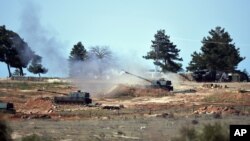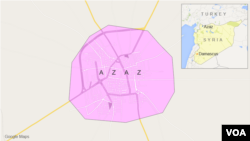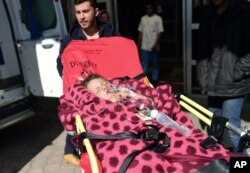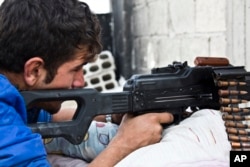Intense fighting in northern Syria, near the Turkish border, has raised sharp concerns that a huge new wave of Syrian refugees will soon be pouring into Turkey.
Turkish officials and a rebel commander manning a border post fear that Assad regime forces and Kurdish fighters will press their offensive to the Syrian border crossing at Azaz, following major gains on the battlefield overnight in the northern Aleppo countryside.
Both the Turks and Syrian rebels say that could spark a new wave of refugees to push toward Turkey. With tens of thousands of desperate civilians crowded in camps along the border near Azaz, Turkey may be forced to admit them, and that could attract even more refugees.
Turkish officials contend this is a deliberate Kurdish strategy to drive as many Sunni Arab families as possible out of the northern Aleppo countryside. This would allow Kurds to lay claim to the territory as part of their homeland, and the Turks believe this plan has been endorsed by the Assad regime, if only as a wartime tactic.
Militiamen with the People’s Protection Units, or YPG - the armed wing of the Syrian Kurdish Democratic Union Party (PYD) - took control overnight of Tell Rifaat, a strategic town 15 kilometers from Azaz that overlooks the junction of two main roads leading to Aleppo city. Tell Rifaat sits higher than the surrounding countryside, providing clear firing lines for artillery batteries.
Pockets of rebel resistance were still reported Tuesday, but the Syrian Observatory for Human Rights, a pro-opposition monitoring group, said the YPG and its allies were in control of Tell Rifaat and the village of Kafr Naseh after heavy clashes with rebel and Islamic factions.
Regime forces — mainly Iranian, Afghan and Iraqi Shi’ite fighters — also seized control of the villages of Masqan and Ihres overnight. Ihres is an important way station for civilians fleeing territory controlled by the Islamic State.
A 'calamity'
The rebel commander overseeing security at the Bab al Samah border crossing said the latest developments are a "calamity."
In an exclusive interview with VOA Tuesday, Abu Ali Sijjos said without Tell Rifaat, rebel fighters have nowhere to establish a defensive line.
“All we can do is to form a protective line around the displaced civilians, but the Russians can still attack with their warplanes and the regime would be able to lob mortars over the line,” Ali Sijjos added.
He confirmed that some rebel factions withdrew Tuesday from the town of Mare’, 25 kilometers north of Aleppo, based on American officials' advice to avoid a clash with the approaching YPG. Those Kurdish fighters are now just seven kilometers from the border at Azaz.
The rebel commander's account of contacts with U.S. officials could not be verified immediately by VOA.
“The Russian warplanes are driving the civilians to the border," Ali Sijjos said, "and they are terrified.” He admitted that rebel fighters are panicking and fear for their families' safety.
If regime forces or the Kurdish YPG militia enter the “Azaz pocket” where tens of thousands of civilians have sought sanctuary, Ali Sijjos said, “the displaced will try to storm the fence if the Turks don’t open the border for them.”
The rebel commander, who survived a jihadist car-bomb attack two months ago, said: “The Turks keep issuing statements that Azaz is a red line for them, but we don’t take them seriously. The Turkish shelling is not really assisting us. It is doing nothing to deter the Russian airstrikes.”
New tide of refugees
According to Turkey’s Hurriyet newspaper, Turkish security officials have warned that PYD militias and Assad regime forces are trying to create a new tide of refugees wave by moving toward Azaz, from which 10 refugee camps stretch along an eight-kilometer route to Kilis in Turkey.
YPG commanders deny they are part of the Assad regime's offensive, or coordinating their activities with Russia's warplanes. They contend they have sheltered Arab Sunni families who fled heavy fighting in the Kurdish enclave of Afrin.
Syrian rebel commanders, however, insist there has been clear military coordination, and say they will never forgive what they consider treachery by the Kurds.
Regardless of the ultimate outcome of Syria's five-year-long civil war, which has already left upwards of 250,000 dead and 11 million people displaced, the Syrian rebels say they will exact revenge on the Kurds for joining a battlefield alliance with the Assad regime.
Kurd betrayal
General Salem Idris, former chief of staff of the Western-backed Free Syrian Army, contends such revenge is inevitable. He says the FSA and the political opposition cautioned U.S. officials that while the YPG may have been a useful ally for the West in the struggle to defeat Islamic State jihadists, in the longer term it was always ready to work with the Assad regime.
"There is very strong coordination between the YPG and the regime," Idris says. "It is not hidden today.”
The moment the regime's offensive began, after repeated Russian airstrikes against rebel targets, Idris said the YPG decided Assad was likely to win and grasped the opportunity to side openly with the regime on the battlefield.
“This will have bad results for the Kurds in the future," the Free Syrian Army general said. "People will remember what they did when we were fighting the regime and Hezbollah, and the Russians and all the mercenaries from Iran and Iraq as well as the Islamic State. They came from behind and attacked us.”
“The U.S. could put more pressure on the Kurds to stop” their intervention on the side of the regime, Idris said.
Other rebel commanders also voice deep bitterness toward the Kurds' political party, the PYD, which they blame for repeated failure of the rebels' efforts to arrange a truce with the Kurdish militiamen.
“They tricked us,” says Mohammed Adeeb of the rebel alliance known as the Shamiya Front.
Nader Othman, the deputy prime minister of the opposition Syrian Interim Government, also says the PYD will come to regret its actions against Sunni Arabs, and he predicts that Kurdish leaders “will discover [Syrian President Bashar] Assad is not to be trusted.”
“He will turn on them when the opportunity presents itself,” Othman said. “But the problem for us is now, and the problem is that the U.S. sees the YPG as a partner when it comes to the Islamic State.”
Impact on US policy
The Kurdish fighters' battlefield moves have been devastating for U.S. policy in Syria, and they are unraveling the alliance the Obama administration has been trying to build to confront and destroy the Islamic State group, according to Daveed Gartenstein-Ross, an analyst with the Foundation for the Defense of Democracies, a Washington think tank.
“It's a complete wreck,” says Gartenstein-Ross. “There are literally U.S.-backed groups fighting other U.S.-backed groups right now. Specifically, the U.S.-backed opposition in northern Aleppo is fighting the U.S.-backed YPG. I have never seen a situation where one CIA-backed group is fighting another with this kind of intensity. It illustrates why so many people have trouble trusting the United States. It's hard for people to believe our government is this incompetent, so they search for some hidden conspiracy,” he says.







